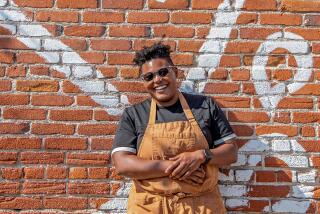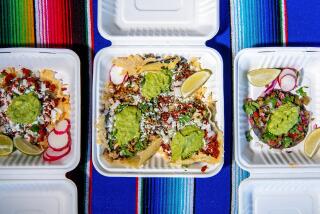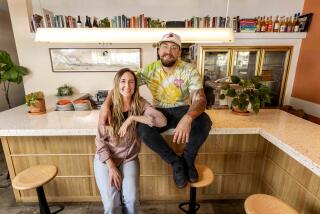Column: ‘Scared like crazy’: Going viral saved Burritos La Palma from the ravages of COVID-19
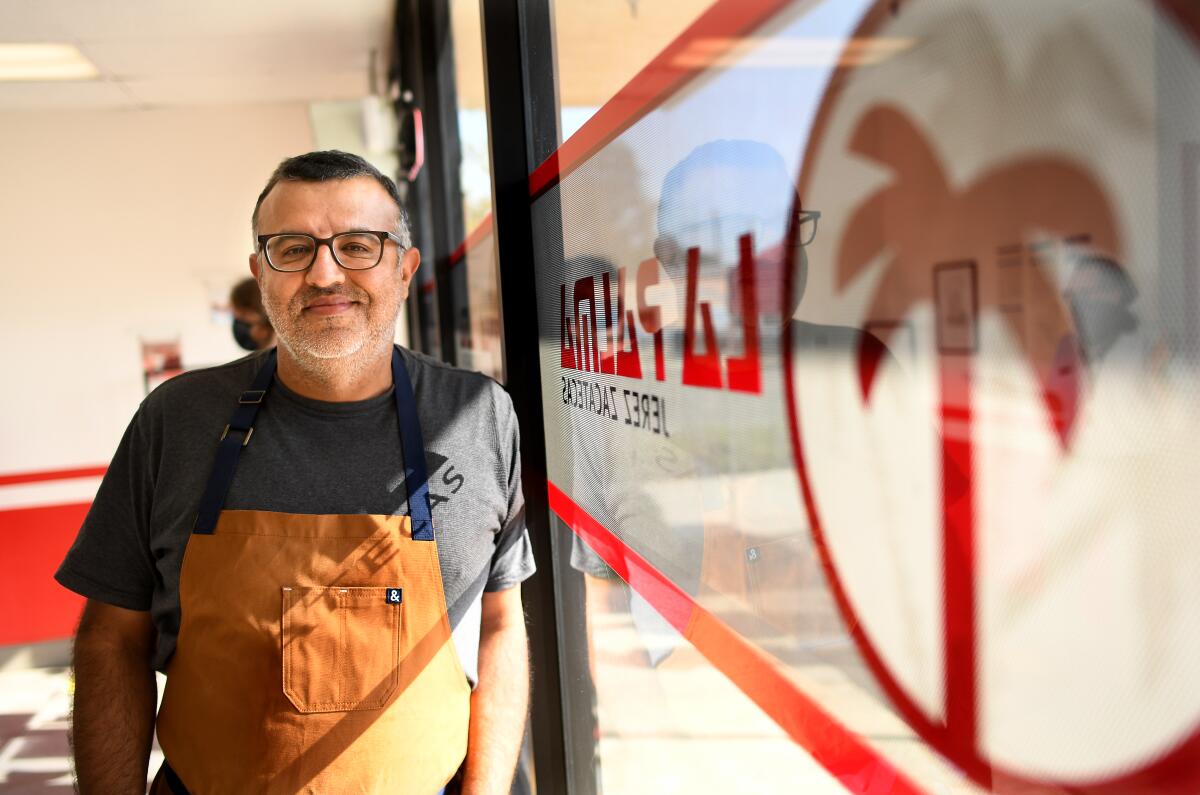
In early June, Albert Bañuelos took stock of his finances and came to the same conclusion that too many restaurateurs have had to make in this coronavirus year:
Maybe it was time to close for good.
His Burritos La Palma, a small chain with spots in Santa Ana, El Monte, and Boyle Heights, had done better than he ever imagined. Its tiny, tasty namesake has been a perennial in best-of lists ever since Bañuelos opened in 2012. He planned for 2020 to be his company’s biggest year yet.
More locations were in the works, along with a full-fledged tortillería. The Coachella music festival had asked La Palma to be a vendor; SoFi Stadium had rewarded him a commissary contract.
“You’re working hard,” said Bañuelos, 54, from a cramped office at his Santa Ana location, “and you’re ready for the next step. You’re going in the right direction. And then, it’s all gone.”
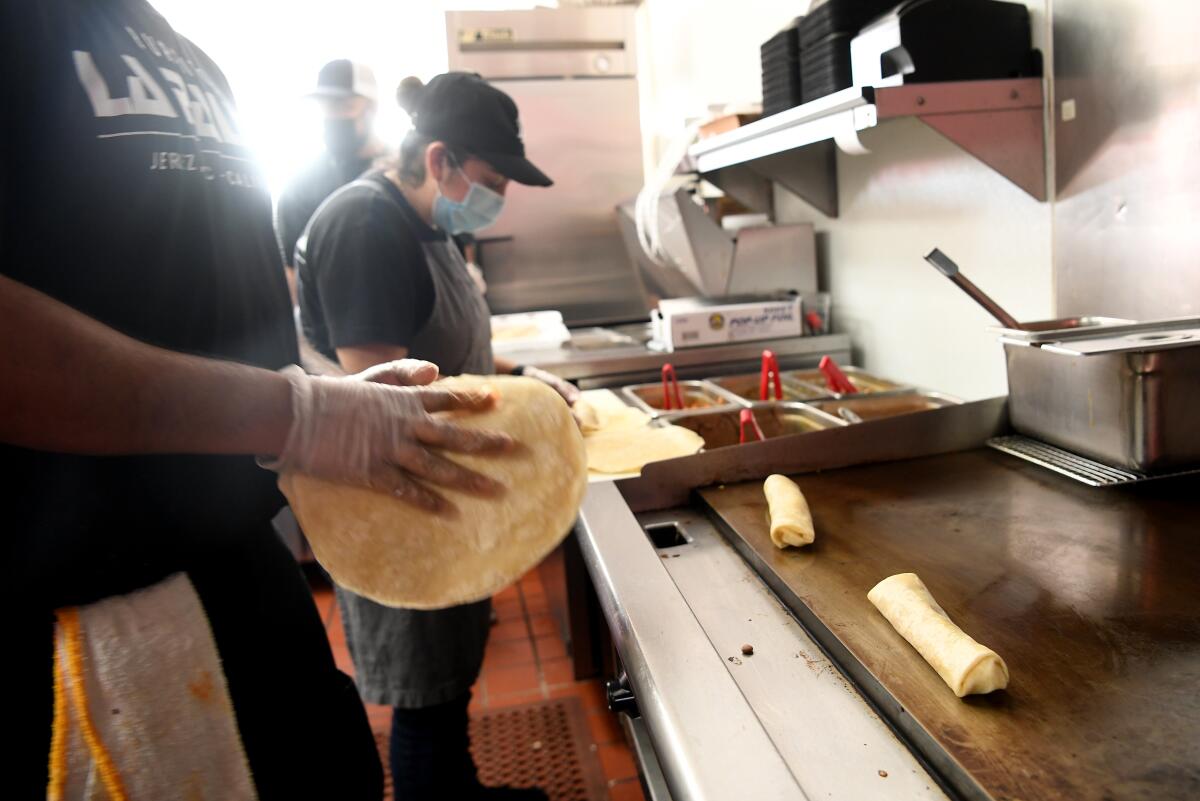
The pandemic froze all his new locations and SoFi contract. The Coachella gig disappeared, along with all catering jobs, which represent 30% of La Palma’s revenue. Bañuelos closed a location at Banc of California Stadium, and canceled contracts with food-delivery apps, not trusting a third party with his food.
He applied for and received a $38,000 PPP loan, and modified all the La Palmas to be coronavirus safe. But sales still dropped dramatically.
“If it was a matter of dollars and cents, I would’ve closed early on,” Bañuelos said. “Pero soy bien ranchero.”
But I’m really country, he proclaimed.
“That mentality doesn’t allow you to cut your losses,” Bañuelos continued. “For you and the team that always believed in you, you can’t let them down.”
And he knew something only a few trusted friends did at the time: Burritos La Palma would appear on the second season of “The Taco Chronicles,” a wildly popular Netflix series. He decided to wait until its debut, and hoped for a miracle.
On Sept. 16 — Mexico’s Independence Day — the new “The Taco Chronicles” dropped at midnight. Burritos La Palma was the star of the burritos episode (I make a cameo to describe burritos as a “cylindrical god.” It’s true, you know).
By 9 a.m. that day, people were calling all La Palmas to place orders. By 10 a.m., a line had already formed outside the Santa Ana storefront though they wouldn’t open for another hour.
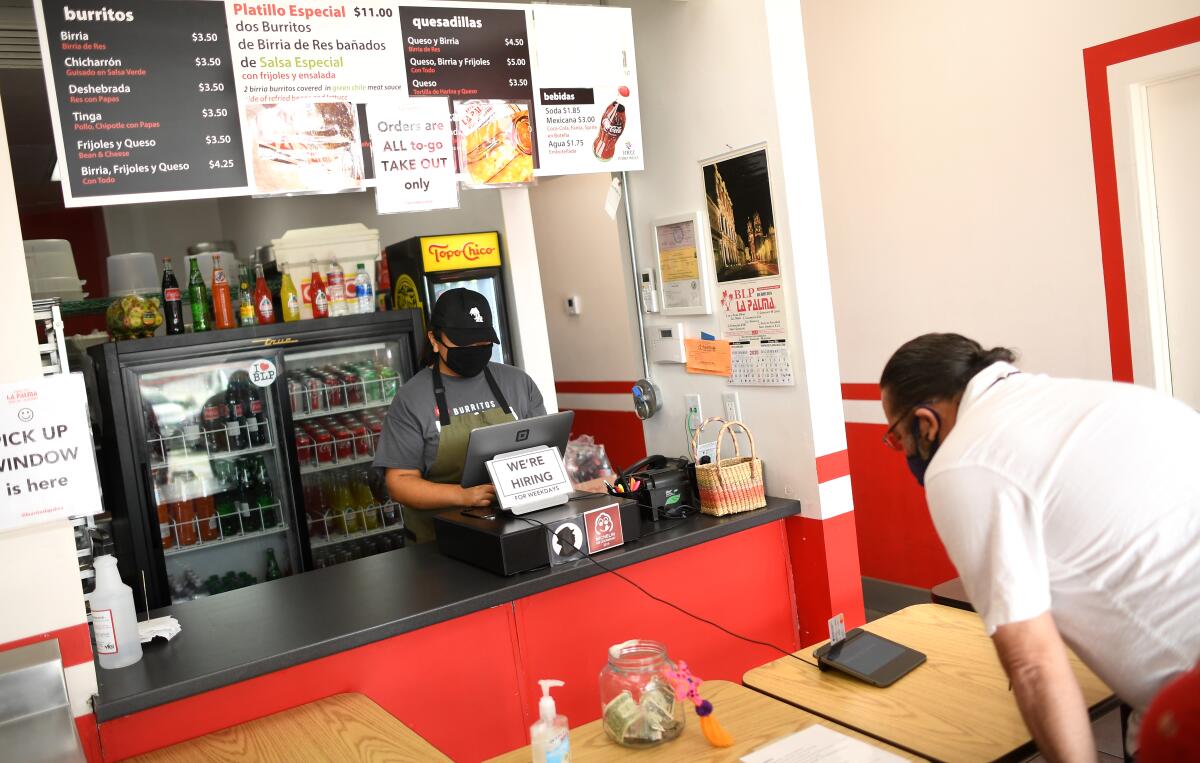
Irony of ironies: what saved Burritos La Palma during a pandemic was going viral.
The two months since have been “nonstop,” said Bañuelos, a tall, burly native of the Mexican state of Zacatecas whose stature masks his easygoing persona. Wait times at his Santa Ana location got to as long as an hour and half. His team became so overworked that La Palma is now closed on Wednesdays to let everyone breathe.
Business remained busier than the pre-coronavirus days when I visited in the wake of California’s latest coronavirus regulations. “Red, Red Wine” by UB40 blared. The phone rang constantly. Kitchen workers seamlessly waltzed from the counter to the stovetop to the dishwasher. Customers picked up to-go orders.
“I’m glad they’re still doing well,” said 42-year-old Ron De Angelis of Irvine, a regular who works down the street. “They deserve it.”
John Li was on vacation from Denver and visited La Palma for the first time after his wife mentioned its Netflix appearance.
“I’m excited to try them,” said the 40-year-old financier as he lugged two boxes of goodies. “Mom and pop places are really suffering, so it’s cool to see that they got some love.”
David Hastie waited for a quesadilla and two burritos. While happy for La Palma’s recent media bumps, the longtime restaurant manager warned “they’re short-lived. Even more so now with so much content. It’s a bigger boost than before, but the drop is also steeper.”
Bañuelos laughed when I shared this with him. “Don’t get me wrong, I’m beyond grateful for Netflix,” he said before opening the door for an eater. “I’m happy. But I’m also scared like crazy.”
**
I’ve covered restaurants in Orange County and beyond for 20 years, so I can say with confidence that no industry is more ruthlessly capitalistic than restaurants.
I’ve seen well-financed millionaires open fancy establishments that close within a year and leave them mired in lawsuits. And I’ve seen success stories like Bañuelos, who started his small empire by selling flour tortillas at the farmer’s market in his hometown of Lake Forest, graduated to a taco truck, and hustled his way to what he has today.
The coronavirus has emerged to become an even more unforgiving leveler of restaurants than the free market.
Restaurants can’t bank on deus ex machina moves like a top-rated TV show to survive. But if they do come, like it did with Burritos La Palma, restaurants should also be equipped with what Bañuelos has but which is lacking in this industry, and much of society right now: heart balanced by reason.
All of his restaurants are simple takeout spots, with a design scheme that looks unfinished because it is. Despite investors courting him with dreams of bigger and flashier places, he’s declined them all, because “you should never overextend yourself.”
Most of his employees have been with Bañuelos for years, allowing La Palma to foster a workplace culture that shines in downturns like this. During a time where just one case of the coronavirus could close La Palma and fatally harm them, no one has contracted it.
“We know that if someone was careless, we’d all pay,” Bañuelos said. “That’s the culture we had before COVID, and that’s the culture we’ll have after.”
“He understands people need to work, but that people need to feel safe and valued,” said 27-year-old Lilyana Garcia of Irvine. She has worked for La Palma for five years and helped to open the Santa Ana location. Early on, Bañuelos had workers wear masks and trained everyone in COVID-19 safety protocol.
“Most bosses aren’t going to be like that,” she continued, while looking up an order. “But more should.”
More crucially, Bañuelos isn’t letting his newfound Netflix fame influence future business plans. He plans to move forward, but only until he feels financially comfortable — and he doesn’t expect that for a while.
“Do I wish I could be enjoying this?” Bañuelos said. “Sure. But the first quarter next year is going to be vicious.”
The lunch rush ended. La Palma was now quiet, save for the “More, more more!” taunts of Billy Idol on “Rebel Yell.”
“Businesses will have to audit themselves, and see where they’re really at,” Bañuelos continued. “It’s going to hit the fan.”
Except he didn’t say “it’s.”
More to Read
Sign up for Essential California
The most important California stories and recommendations in your inbox every morning.
You may occasionally receive promotional content from the Los Angeles Times.
